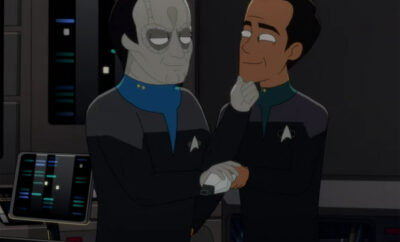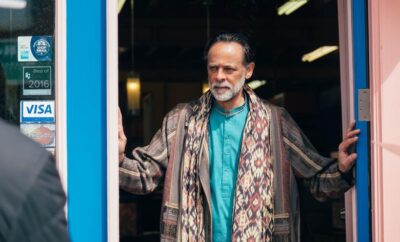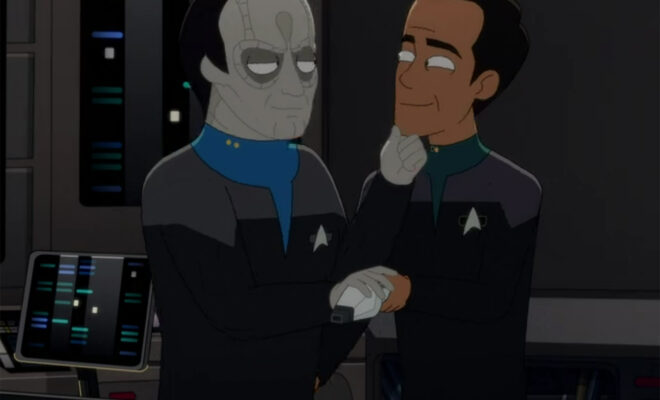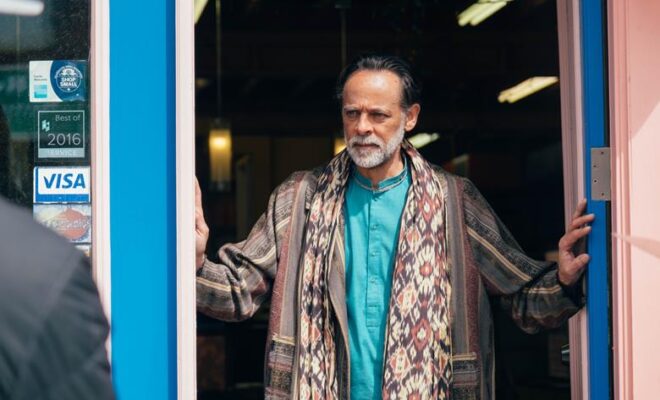News
Sid in Star Trek Magazine Genius Issue
Star Trek Magazine has a new interview with Sid in their latest issue (#27), The Genius Issue. The font in the magazine is tiny, so we’ve retyped it to spare your eyesight.
“It’s weird,” says Alexander Siddig, pondering the 18 years that have passed since he first played Doctor Julian Bashir in Star Trek: Deep Space Nine. “In some ways, it’s like it’s only yesterday. People are watching it now. I’m still getting stopped in the supermarket. I think it’s got a major resurgence from the latest film, but other than that, it feels like a lifetime ago.”
When DS9 began, Siddig’s character was introduced with very little in the way of backstory, because the actor’s Sudanese/English heritage conflicted with the writers’ original plans. “I think I was sort of shoehorned into the role,” he reflects. “He was supposed to be, I think, Spanish. When I arrived, everything they’d written for this character was wrong, and they had to come up with new stuff.”
Bashir was also quite difficult to like – brash, socially awkward, and serially unsuccessful in romance. “He was useless!” Siddig laughs. “One of the huge mistakes of the publicity department at the time was to sell me, the actor, as this hunk, which was a massive error, because not under any circumstances could I be described as a ‘hunk’! At the time, there were shows like 90210 – that whole plethora of young, handsome children on television – and I was not prepared to compete with that lot! I much preferred to be a struggling young doctor, dealing with his own emotions and growing up, than someone who’s cool and well-groomed, seducing everyone in sight.”
To help pin the character down, Siddig came up with a vague character for Bashir. “I kept it fairly loose in my mind,” he explains, “because we never got told about storylines before we got the script. But I had a basic idea of what this guy was like at school and college, and that’s all he had ever experienced, so I didn’t have to come up with a really complicated interwoven fabric of stuff. I just had to come up with the basics: he’s a perfectly nice bloke, who just hasn’t figured out how to be sociable. He just hasn’t got that element down; he doesn’t understand it. That can get him into all kinds of trouble, and make him really unpopular, or at least make people veer away from him, so he throws himself into work, and becomes pretty good at what he does. Bashir was inventing himself, in front of everybody. Pretending to be confident, pretending to be interesting.”
Despite his early insecurities, Bashir was a brilliant doctor, and although he often made mistakes, he was also one of Star Trek‘s cleverest human characters, consistently displaying enormous natural intelligence. But this was turned on its head in the show’s fifth season, when the episode “Doctor Bashir, I Presume?” revealed that this impressive intellect was actually the result of genetic engineering during his childhood.
“I read the script one week, and there it was,” Siddig recalls, with a frown. “Boom, I’m genetically engineered! I thought it was farcical. I remember now, event to this day, being so unimpressed by that sudden twist in my character. I didn’t think there was any need for it. I remember throwing away every line that they gave me – not throwing away in the bin, but literally delivering the lines as if they’re not interesting. Had they come to me and talked about it, we could have done something a little bit more organic. We could have found a way into there, without forcing a peg into the wrong-shaped hole.”
How would Siddig have preferred that plot twist to be executed, then? “I think the mot important thing, to start with, is that we should have played to the audience,” he considers. “It shouldn’t have been a secret that he’d been holding down for years and years and years. It should have been a complete surprise to him: ‘Me? I’m genetically engineered?’ Like that moment you find out you were adopted. I would have liked that to happen, at least, as a kind of entry into it.”
Did that fact that his intelligence was artifical undermine the character? “Totally,” says Siddig. “He’s not as interesting any more. They had to find something else for him. Everybody forgot about the genetically engineered thing, and it became much more interesting again. But that nearly destroyed the character.”
If Bashir’s past had been conceived at the start of the series, Siddig is sure he would have played the character in a different way. “If he’d been genetically engineered from the beginning, he would’ve been a much more secure, solid, certain character,” he explains. “If you had hypothetically been genetically engineered, you would know you were pretty good at certain things. You would concentrate on doing your work without trying to please people. You just wouldn’t need to. You’d become a lot drier. But Bashir didn’t know enough about himself – the whole point of Bashir was that he was making mistakes, going up blind alleys about who he thought he was, and how cool he thought he was, and was constantly surprised and having sand kicked in his face. If I’d known about the genetic engineering much earlier, he would never have started that way. He would have been much more the cool boy, because what’s the point in messing around? There would have been no point in giving him frailties.”
However, although Siddig disliked the change to his character, he approved of the genetic engineering storyline as a concept, and though follow-up episodes (such as “Statistical Probabilities” and “Chrysalis”, which saw Bashir mentor a group of four other engineered humans) were good.
“Those were really interesting,” smiles Siddig. “I wouldn’t be surprised if they did the whole genetic engineering thing to get those shows on, because those really were interesting shows. I still think now, it would have been more interesting had I been shot that genetically engineered, but sometimes, storylines are so good that you’ve got to find a way to make them work, and in this case, I believe they tried to fit Bashir into this terrific idea, to the detriment of Bashir the character.”
Aside from the revelations about his past, Siddig approved of the direction taken by both Bashir (“I loved all the spy stuff, and I loved the way the writers made him darker”) and the series as a whole.
“One of the interesting things for me, during the making of the show, as that the Federation was way more imperfect than it had been on Star Trek: The Next Generation,” he says, citing the introduction of Section 31 – the Federation’s shadowy black ops department – as an example. “The Federation was a sort of America of the 1990s, in a funny way: it was hegemonistic, it was arrogant, it thought it could run the world without any trouble. I think that Section 31 were a little bit more subtle than that: they knew there was dirty work to be done, and the Federation could get away with a clean image. It brought a whole layer of political honesty to the show, which I really liked. It dealt with the Maquis, and it dealt with Bajoran rebels, and all sorts of other things, and Section 31 came in as an organization that were walking two steps behind, stabbing people who were inconvenient. And that was really interesting to me.”
Siddig seems genuinely proud to have been part of the way DS9 pushed the boundaries of Star Trek. “I think it still remains an individual show, in the whole Star Trek genre,” he suggests. “It’s the only one like it. It’s very different. It has the stamp of Ron Moore on it, and Ira Behr.”
One way in which DS9 differs from stable mates is the degree of character development afforded to its leads – Bashir, for example, was initially difficult for audiences and the studio to warm to but ended the series as one of its most popular characters.
“It wasn’t really until the fourth or fifth season that the executive producer opened up to me and said, ‘Listen, the first two years of this show, every single time we had a big executive meeting with the studio bosses, they were trying to fire you!'” Siddig remembers. “They look at your numbers, and see you’re easily the most unpopular character in the show. But we’d made a deal, the producer Rick Berman and myself, that the guy would start off hopeless, and evolve. We had the luxury of time. We knew we were going to do at least six seasons.”
DS9 also broke new ground by featuring so many interpersonal relationships. Bashir particularly bonded (if slightly antagonistically) with Miles O’Brien (Colm Meaney) and Garak (Andrew J. Robinson). “They classically exploited the British/Irish thing,” says Siddig, of the Bashir/O’Brien friendship. “We were going to be this pair who bickered at every opportunity.
“And it actually continued off-stage – Colm and I had furious fights about England and Ireland, and I had no idea politically about any of the stuff. I suspect now, looking back, that he didn’t have any idea either, but he spoke so passionately and vehemently about it that I believed every word he said! But he would take me to Irish bars, especially to ridicule me in front of the Irish clientele! It was good fun in the end. We loved to hate each other. And we chose to go out with each other, even if it was to argue all night, so there must have been some bond there, beyond the ordinary. I really enjoyed my time with Colm, and I really enjoyed the relationship that developed as a result of that. In a shoe ostensibly about freedom, rebellion, terrorism, and religious oppression, this was a relationship that came out of dislike, but blossomed into a real love, which was really great.”
At the time, Siddig wasn’t aware that the friendship between those characters was unusual for a Star Trek series. “I did notice, however, that we were exploring subjects in a much deeper way than TNG ever did,” he points out, “and that was largely a piece of economic an creative bravery on the part of the producers of our show. Shows were designed in those days to be picked up anywhere in the series, because they were sold to syndicated television stations to be viewed in any order, as a matter of convenience more than anything else. I think our show as one of the first that you had to play three or four episodes in order to have a clue what was going on.”
After DS9‘s run ended in 1999, its style of serialized storytelling wasn’t attempted again in Star Trek until the penultimate year of Star Trek: Enterprise, in 2003. “They lost their courage,” Siddig believes. “They thought that DS9 was a mistake for several years, and so they hurried to get another show on that more accurately repeated the success of TNG. Hence along came Star Trek: Voyager, which is pretty much an exact copy of TNG. Voyager was a decent show, but was not original. Nobody can tell me that was an original concept. Enterprise was kind of a comedy of errors in the same sense. They should have looked to the left or right and seen what Battlestar Galactica was doing, or even Bablyon 5, and gone ‘Well, there is a market for the DS9 style’.”
Since DS9’s finale, Siddig has starred in numerous movies (including Syriana and Kingdom of Heaven), and has moved back to England, where he’s appeared in popular TV series like Spooks and Merlin. “I love drifting,” he enthuses. “The downside is that it’s difficult to keep your family life together when you don’t know what you’re doing fro one week to the next – but I’m divorced now, and my children are in America, so that isn’t such a great concern. The variety, meeting the amazing directors and producers, the actors, the change every three or four months… It’s like starting a new career every few months, and that’s fantastic. I really enjoy that.”










5 Comments